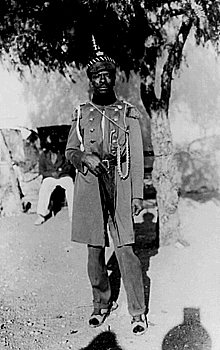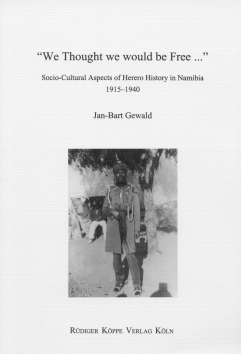



The present study contains the history of the reconstruction of ethnic identity after 1904 tried by the Herero, an ethnos mainly living in central and northern Namibia. 1904 was the year when most of the Herero people were killed by German troops. The author specifically deals with the period of 1915–1940 when Namibia was under South African rule, a period which is specially important because of the renaissance of the Herero nation.
By narrating stories from daily life of the Herero people under colonial power, the socio-political processes come to the fore. Apart from the efforts by the Herero themselves to restitute their society, the Rhenish Mission and the South African administration exerted influence on this reconstruction. In this context, the author makes obvious that the Rhenish Mission lost its former influence on the Herero people, whereas the South African administration intensified their authority.
Following the links below you will find further publications on Herero language and culture:
Die Arbeit von Jan-Bart Gewald [...] fängt da an, wo die meisten Veröffentlichungen über die Herero aufhören, nämlich nach dem Völkermord. Was geschah mit den Herero, nachdem die Deutschen versucht hatten, das ganze Volk auszurotten? Gewald zeigt, wie es den überlebenden Herero gelang, wieder in ihre Heimat Namibia, aus der die Deutschen sie vertrieben hatten, zurückzukehren, und wie sie es schafften, nachdem die Deutschen ihre Sozialstruktur nachhaltig zerstört hatten, unter großen Schwierigkeiten, aber letzlich erfolgreich, sich neue Strukturen zu geben. Bei diesem Prozess spielte auch die Mission eine nicht unerhebliche Rolle.
Ursula Trüper in NZM Neue Zeitschrift für Missionswissenschaft, 60/2, 2004, 158-159
While much of the Herero historiography has been based on the rich and well-ordered National Archives of Namibia, the particular strength of this volume lies in its extensive use of the erstwhile Rhenish Mission Archives. [...]
His concern is with how the Rhenish Mission slowly lost its hold on the Herero during the interwar years and how Herero invented ways of dealing with colonialism.
Robert J. Gordon in International Journal of African Historical Studies, 34/3, 2001, 699-700
© 2026 by Rüdiger Köppe Verlag – www.koeppe.de